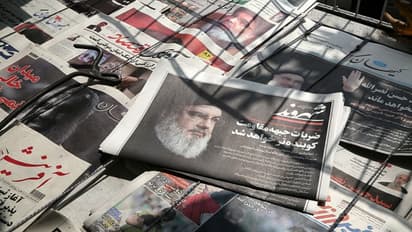EXPLOSIVE! Israel used 900kg US-made bomb to eliminate Hezbollah chief Hassan Nasrallah, says Senator Kelly

Synopsis
In a bold revelation on Sunday, US Senator Mark Kelly confirmed that Israel employed an American-made guided weapon to target and kill Hezbollah chief Hassan Nasrallah.
In a bold revelation on Sunday, US Senator Mark Kelly confirmed that Israel employed an American-made guided weapon to target and kill Hezbollah chief Hassan Nasrallah. The bomb, a formidable 2,000-lb (900-kg) Mark 84 series, was deployed during the high-stakes Israeli airstrike that eliminated one of Hezbollah’s most prominent figures.
Senator Kelly, who heads the Senate Armed Services Airland Subcommittee, shed light on the increasing use of sophisticated munitions in Israel's ongoing military operations. “We see more use of guided munitions, JDAMs, and we continue to provide those weapons,” Kelly remarked, referring to the Joint Direct Attack Munitions (JDAMs) supplied by the United States. He further disclosed, “That 2,000-pound bomb that was used, that’s a Mark 84 series bomb, to take out Nasrallah,” as reported by Reuters.
Israel has been heavily reliant on US-supplied weaponry, particularly since the eruption of the Israel-Hamas conflict. Despite this close military collaboration, the White House acknowledged that Israel had not provided prior notice of the strike that targeted Nasrallah in Beirut. It wasn’t until Israeli fighter jets were already en route that US President Joe Biden was informed.
The airstrike marks a significant escalation in Israel’s aggressive campaign against Hezbollah, particularly following the group's alignment with Hamas after the latter's unexpected attack on southern Israel. Over the past week, Israel’s military actions have decimated Hezbollah’s leadership, claiming the lives of seven high-ranking commanders, including the powerful Hassan Nasrallah.
This sudden wave of losses has dealt a severe blow to Hezbollah, Lebanon’s most dominant military and political entity. The deaths include Nabil Kaouk, a veteran commander who joined Hezbollah during its formative years in the 1980s and was widely regarded as a potential successor to Nasrallah.
Check the Breaking News Today and Latest News from across India and around the world. Stay updated with the latest World News and global developments from politics to economy and current affairs. Get in-depth coverage of China News, Europe News, Pakistan News, and South Asia News, along with top headlines from the UK and US. Follow expert analysis, international trends, and breaking updates from around the globe. Download the Asianet News Official App from the Android Play Store and iPhone App Store for accurate and timely news updates anytime, anywhere.